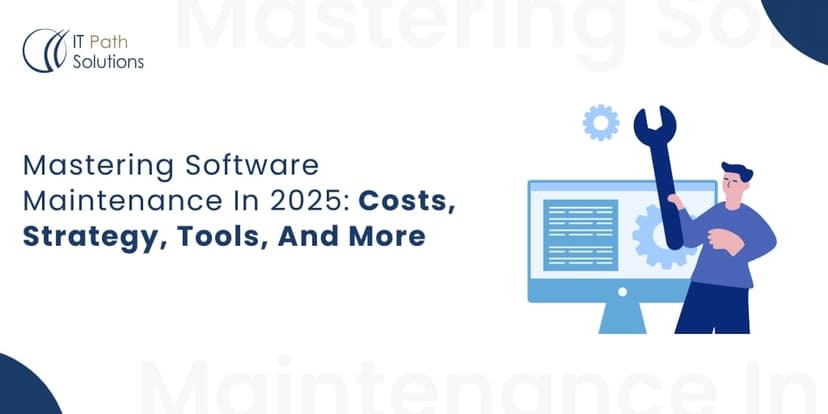What is SaaS (Software as a Service) and Why It Matters for Businesses
Keyur Patel
September 12, 2025
9 min
In today’s fast-paced digital landscape, Software as a Service (SaaS), also known as on-demand software, has emerged as a game-changer for businesses and individuals alike. SaaS is a cloud-based software delivery model where applications and their associated data are hosted centrally and accessed via the internet, typically through a web browser. This model eliminates the need for complex installations, hardware maintenance, and manual updates, making it a preferred choice for organizations of all sizes.
What is SaaS?
SaaS is a multi-tenant architecture, meaning a single instance of the software serves multiple customers (tenants). This approach leverages virtualization to optimize resource usage and reduce costs. Unlike traditional software models, SaaS operates on a subscription-based pricing model, where users pay a monthly or annual fee to access the software. This “pay-as-you-go” model ensures flexibility and affordability, especially for small businesses and startups.
Key Characteristics of SaaS
The key characteristics of SaaS (Software as a Service) set it apart from traditional software delivery models. Some of the most important features include:
-
Centralized Hosting: In a SaaS model, software and data are hosted centrally in the cloud rather than on local servers. This ensures that users can access SaaS applications from anywhere, anytime, with just an internet connection, making it highly convenient for remote teams and global businesses.
-
Open Integration Protocols: Modern SaaS solutions are built to integrate easily with other business tools. They rely on open standards like HTTP/HTTPS, JSON, REST, and SOAP, allowing seamless connectivity with CRMs, ERPs, and other third-party systems. This interoperability makes SaaS ideal for organizations that rely on multiple platforms.
-
Accelerated Feature Delivery: One of the biggest advantages of SaaS is the speed at which new features, bug fixes, and security updates are delivered. Instead of manual installations or version upgrades, SaaS providers continuously roll out updates, ensuring users always have access to the latest features without downtime.
-
Scalability and Flexibility: SaaS platforms are designed to scale according to business needs. Whether a startup adds new employees or an enterprise experiences seasonal demand, SaaS makes it simple to scale up or down instantly. This scalability helps businesses control costs and pay only for the resources they use.
The Rise of SaaS in the Cloud Computing Stack
Cloud computing has become the backbone of modern IT infrastructure, and SaaS is one of its most prominent layers. The cloud computing stack includes:
| Cloud Service Model | Description | Examples |
|---|---|---|
| Infrastructure as a Service (IaaS) | Provides virtualized computing resources such as servers, storage, and networking over the internet. IaaS allows businesses to scale infrastructure on demand without heavy upfront investment. | AWS EC2 |
| Platform as a Service (PaaS) | Offers a fully managed platform for developers to build, deploy, and manage applications without worrying about the underlying infrastructure, accelerating development and deployment. | Google App Engine |
| Software as a Service (SaaS) | Delivers ready-to-use, cloud-hosted software applications accessible from any device, reducing installation hassles and providing continuous updates and collaboration. | Salesforce, Microsoft 365 |
| Monitoring as a Service (MaaS) | Provides cloud-based monitoring and management of IT infrastructure, offering real-time insights into performance, availability, and security without in-house systems. | Datadog, Site24x7 |
| Communication as a Service (CaaS) | Offers cloud-based communication tools such as VoIP, video conferencing, and messaging, enabling efficient team collaboration while reducing infrastructure costs. | Zoom, RingCentral |
| Anything as a Service (XaaS) | Extends the “as-a-service” approach to nearly any IT function, including storage, networking, and AI-driven analytics, providing flexible and scalable solutions. | Varies by provider |
Why Businesses Love SaaS: Key Benefits
From startups to large enterprises, SaaS (Software as a Service) has become a cornerstone of digital transformation. The advantages of SaaS go beyond cost savings—it empowers businesses with flexibility, accessibility, and innovation. Here’s why companies are rapidly embracing the SaaS model:
-
Cost-Effective: The subscription-based SaaS pricing model eliminates heavy upfront software investments and reduces infrastructure costs. Businesses pay only for what they use, making SaaS affordable for small businesses and scalable for enterprises.
-
Scalability: SaaS applications grow with your business needs. Whether you need to add more users, expand storage, or integrate additional features, SaaS makes scaling effortless without large capital expenses.
-
Accessibility Anytime, Anywhere: With cloud-based SaaS software, teams can access applications and data from any device, anywhere in the world, simply by logging into a web browser. This makes SaaS ideal for remote and hybrid work environments.
-
Automatic Updates and Maintenance: One of the biggest benefits of SaaS is that providers manage all updates, patches, and maintenance. This ensures that businesses always operate with the latest features, improved performance, and enhanced security—without IT overhead.
-
Enhanced Collaboration: Centralized, cloud-hosted data fosters real-time collaboration across departments and geographies. SaaS tools like Slack, Zoom, and Google Workspace enable seamless communication and teamwork.
-
Disaster Recovery and Security: Leading SaaS platforms invest heavily in backup systems, encryption, and disaster recovery protocols. This reduces the risk of data loss and ensures business continuity even during unexpected events.
-
Agile Development and Innovation: The SaaS model supports rapid iteration, continuous delivery, and quick adaptation to market demands. Businesses benefit from frequent enhancements that align with agile development practices.
Latest Trends in SaaS
The SaaS industry is evolving rapidly, driven by advancements in technology and changing business needs. Here are some of the latest trends shaping the future of SaaS:
- AI and Machine Learning Integration: SaaS platforms are increasingly incorporating AI and ML to offer predictive analytics, automation, and personalized user experiences.
- Vertical SaaS: Industry-specific SaaS solutions are gaining traction, catering to niche markets like healthcare, finance, and retail.
- Low-Code/No-Code Platforms: These empower non-technical users to build custom applications without extensive coding knowledge.
- Enhanced Security: With the rise in cyber threats, SaaS providers are investing heavily in advanced security measures like encryption, multi-factor authentication, and zero-trust architecture.
- Edge Computing: SaaS applications are being optimized for edge computing to reduce latency and improve performance.
- Sustainability: Green SaaS solutions are emerging, focusing on reducing the environmental impact of cloud computing.
SaaS Case Studies: Leading Providers
Two of the biggest names in the SaaS and cloud computing space are Amazon Web Services (AWS) and Google Cloud Platform (GCP). These leading SaaS providers showcase how scalable, cloud-based services are transforming the way businesses operate. Here’s a closer look at their offerings:
Amazon Web Services (AWS)
AWS is one of the most widely recognized SaaS platforms and cloud providers in the world. It offers a broad range of cloud-based SaaS solutions that power businesses of all sizes:
-
Storage: Services like Amazon S3 (Simple Storage Service) and EBS (Elastic Block Store) provide secure, scalable, and cost-effective cloud storage. These solutions are widely used by companies for backup, disaster recovery, and big data analytics.
-
Networking: Amazon VPC (Virtual Private Cloud) and Route 53 enable businesses to create secure, private networks and manage domain name services seamlessly.
-
Database: With tools like Amazon DynamoDB (a NoSQL database) and RDS (Relational Database Service), AWS makes it easy to manage structured and unstructured data in the cloud.
-
Compute: Amazon EC2 (Elastic Compute Cloud) and EMR (Elastic MapReduce) provide on-demand computing power and big data processing, making AWS ideal for enterprises with high-performance needs.
These services illustrate why AWS is often highlighted in SaaS case studies as a model for scalability, innovation, and reliability.
Google Cloud Platform (GCP)
Google Cloud Platform is another leading name in the SaaS industry, offering innovative and developer-friendly solutions. One of its most popular offerings is:
-
Google App Engine: A fully managed Platform as a Service (PaaS) that allows developers to build, test, and deploy applications without managing underlying infrastructure. This service is particularly valued by startups and enterprises seeking rapid development and seamless scalability.
GCP’s focus on ease of use, AI integration, and global infrastructure makes it a strong competitor in the SaaS provider ecosystem.
The Future of SaaS
As businesses continue to embrace digital transformation, SaaS will play an even more critical role in driving innovation and efficiency. With advancements in AI, edge computing, and industry-specific solutions, SaaS is poised to become more intelligent, secure, and accessible. Whether you’re a small business owner or a large enterprise, adopting SaaS can help you stay competitive in today’s dynamic market.
How IT Path Solutions Helps You Build Scalable SaaS Applications
At IT Path Solutions, we specialize in helping businesses turn their SaaS ideas into powerful, cloud-based applications that scale with growth. With deep expertise in AWS, Google Cloud, and Azure, along with a strong foundation in modern web and mobile technologies, our team builds custom SaaS solutions that are secure, scalable, and user-friendly. From initial consulting and MVP development to deployment and ongoing maintenance, we follow agile practices to deliver frequent updates, seamless integrations, and robust performance. By partnering with IT Path Solutions, you gain a trusted SaaS development company that ensures your product is not only launched successfully but also evolves to meet changing business needs—making your SaaS journey smooth, reliable, and future-ready.
Conclusion
SaaS has transformed the way businesses use and deliver software. By offering cost savings, scalability, accessibility, and seamless updates, the SaaS model has become an essential part of modern digital transformation. Whether you are a startup looking for affordable solutions or an enterprise seeking efficiency and agility, SaaS applications provide the flexibility to adapt and grow. As technology continues to evolve, the future of SaaS will only bring more innovation, making it a reliable choice for organizations across industries.
FAQ
1. What is SaaS in simple terms?
SaaS, or Software as a Service, is a cloud-based software model where applications are hosted online and accessed through a web browser instead of being installed locally.
2. What are some popular examples of SaaS applications?
Common SaaS examples include Salesforce (CRM), Google Workspace (productivity), Zoom (communication), Dropbox (storage), and Slack (collaboration).
3. What are the main advantages of SaaS for businesses?
The key benefits of SaaS include lower upfront costs, scalability, remote accessibility, automatic updates, enhanced collaboration, and strong data security.
4. How is SaaS different from traditional software?
Unlike traditional software that requires installation and manual updates, SaaS runs in the cloud, follows a subscription pricing model, and provides instant updates with no local maintenance.
5. Is SaaS suitable for small businesses and startups?
Yes. The SaaS model is especially cost-effective for small businesses and startups because it requires no upfront hardware investment and allows flexible pay-as-you-go usage.

Keyur Patel
Co-Founder
Keyur Patel is the director at IT Path Solutions, where he helps businesses develop scalable applications. With his extensive experience and visionary approach, he leads the team to create futuristic solutions. Keyur Patel has exceptional leadership skills and technical expertise in Node.js, .Net, React.js, AI/ML, and PHP frameworks. His dedication to driving digital transformation makes him an invaluable asset to the company.
Related Blog Posts

Top 7 Custom Software Development Challenges (and How to Overcome Them in 2026)
Think like this. It is Q3 of 2025. You are a CTO or a Product Manager. You have just secured the budget for a new enterprise platform that promises to revolutionize your supply chain. You hire a software development company, sign the contracts, and the kickoff meeting feels perfect. Everyone is nodding. Everyone gets it.… Top 7 Custom Software Development Challenges (and How to Overcome Them in 2026)

Mastering Software Maintenance In 2025: Costs, Strategy, Tools, And More
Software is never truly finished. The moment it goes live, the real work begins. No matter how carefully it’s developed, an application cannot remain functional, secure, and competitive without continuous upkeep. Imagine launching a sleek, high-performing app only to see it slowly break down due to hidden bugs, compatibility issues, or outdated compliance requirements. That… Mastering Software Maintenance In 2025: Costs, Strategy, Tools, And More

How To Build A Load Planning Software In 2025: Features, Cost, Steps, & More
Imagine a logistics operation where every shipment is precisely packed, trucks leave the dock fully utilized, and last-minute changes are handled without panic or paperwork. Now, picture all of that happening without relying on complex spreadsheets or outdated manual planning. That is not a futuristic fantasy. It is what savvy businesses are already doing in… How To Build A Load Planning Software In 2025: Features, Cost, Steps, & More
